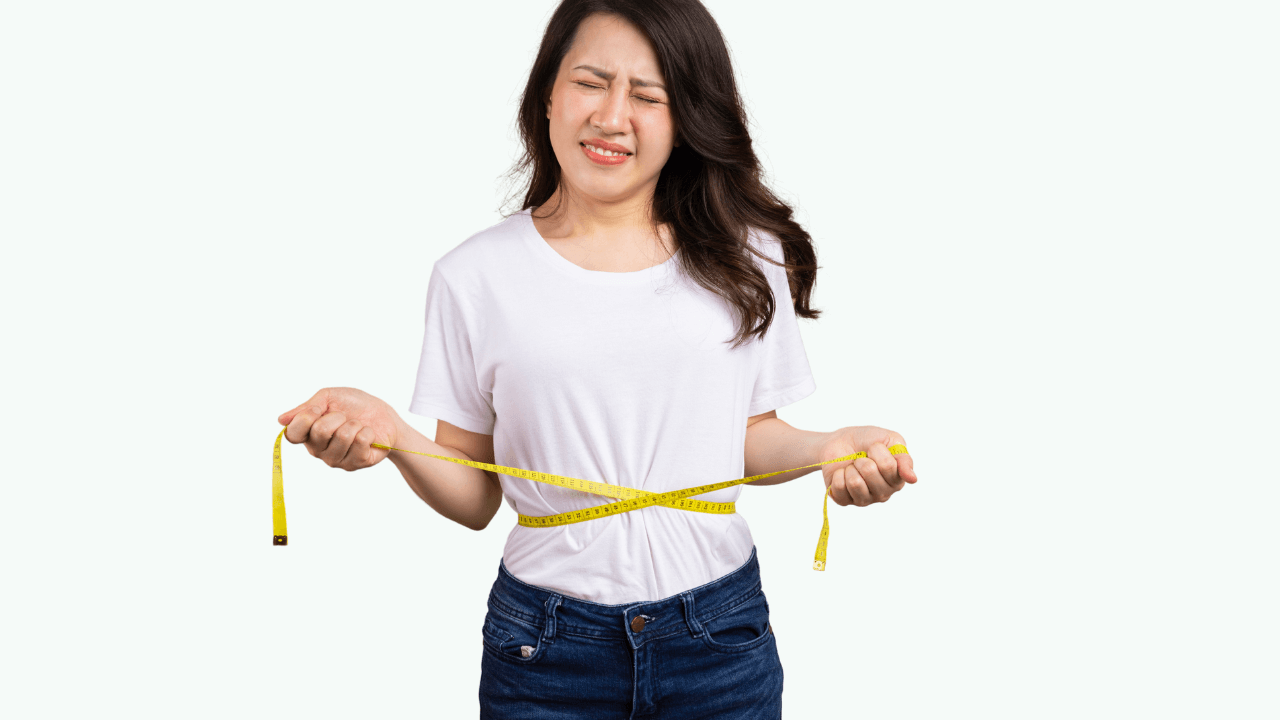

Menstruation could make you experience hormonal changes, which may lead to weight gain. This abrupt weight gain might be uncomfortable, but it is not permanent and tends to go away in a few days to a week.
Sometimes, menstruation may cause unwanted fluid retention and also alter your appetite for some days. It could increase discomfort and pain for a certain amount of time. However, simple ways may help you easily manage weight gain during period.
Read this exclusive article to learn how to help prevent weight gain during menstruation. This article also answers all your questions about the causes of period weight gain and effective strategies to manage it.
During your menstrual cycle, it’s common to experience weight changes. According to a study, gaining approximately 0.5kg is normal. This weight change may be due to extracellular fluid retention during menstruation days.

The hormonal changes during your menstrual cycle could significantly impact your appetite, leading to food cravings and potentially overeating. These cravings may be intense and challenging to resist, causing you to reach for unhealthy, high-calorie foods.
Progesterone hormone level could increase the week before your period, stimulating appetite. It may result in eating more than usual and feeling constantly hungry. Estrogen hormone levels might decrease before your period, leading to an increased appetite.
Low serotonin levels may trigger sugar cravings. High-carbohydrate foods induce the body to produce serotonin, so the brain craves more sugar when serotonin is low.
Fluctuations in metabolic rate during your menstrual cycle could also contribute to a bigger appetite and cravings for high-calorie foods. Consuming high-sugar foods to satisfy these cravings could increase calorie intake and weight gain.
You may experience gastrointestinal problems during your menstrual cycle. Throughout the cycle, hormonal fluctuations could lead to gastrointestinal issues like constipation, diarrhea, and abdominal pain. These discomforts could make you feel like you have gained weight.
About a week before the period starts, progesterone levels increase. This hormone impairs intestinal muscle contractions, resulting in slow digestion and constipation. The uterus releases prostaglandins as the period begins, causing muscle contractions in the uterus and gut. These contractions could lead to pelvic and abdominal pain. Prostaglandins could also disrupt electrolytes and fluid balance in the small intestine, causing diarrhea.
Hormonal changes are a normal part of the menstrual cycle and may cause various symptoms affecting your weight and appetite.
Estrogen and progesterone levels fluctuate before your period, signaling the start of menstruation. These hormonal fluctuations may cause water retention, causing swelling and puffiness in various body parts.
Bloating during your period can make you feel like you’ve gained weight, but it’s not true weight gain. It is often due to water retention and increased gas in the gastrointestinal tract.
Hormonal changes before and during your period could affect your energy levels and may make exercise uncomfortable. However, regular exercise throughout the month might help prevent weight gain during your period.
When your period begins, magnesium levels could gradually decline, which may provoke sugar cravings and contribute to weight gain.
Low magnesium levels can cause dehydration that might sometimes mask itself as hunger, leading you to desire sugary foods when you’re just thirsty.
The drop in magnesium levels during your period can trigger sugar cravings. It could also disrupt the balance of essential nutrients, leading to cravings and overeating.
Bloating, cramps, increased hunger, and cravings during the period may make you feel less motivated to exercise. However, skipping workouts can contribute to weight gain, especially if you consume more calories than usual.
A week before your period, estrogen and progesterone levels fluctuate, leading to fatigue and low endurance. As your period approaches, it’s understandable that exercise may feel uncomfortable. However, regular exercise throughout the month may help prevent weight gain during your period.
Exercises like low-intensity cardio, yoga, or pilates may alleviate symptoms like bloating and cramps. It stimulates bowel movements, reducing bloating and aiding digestion.
Hormonal fluctuations during menstruation may increase gas in your gastrointestinal tract, leading to bloating. It can make your stomach feel tight or swollen. The water retention caused by hormonal changes might also contribute to bloating.
The release of prostaglandins by your uterus triggers stomach cramps, which subsequently can give you the sensation of weight gain. Prostaglandins cause your uterus to contract and shed its lining, causing abdominal pain during your period. It can further contribute to the discomfort and bloating you may experience.
There are various physical and emotional symptoms that you may experience during your period. These symptoms might vary from person to person and may differ each month or with age:
Supplements like magnesium may help you with bloating, breast tenderness, and PMS-related mood disturbances. It could also help regulate serotonin levels and reduce water retention.
Studies showed that vitamin B6 supplements may help relieve symptoms of PMS, including bloating and mood swings. Add this vitamin into your diet through supplements or foods rich in vitamin B6, like bananas and chickpeas.
Evening primrose oil contains gamma-linolenic acid (GLA) with anti-inflammatory properties. It may help alleviate breast tenderness, bloating, and irritability during your period.
Consuming complex carbohydrates could reduce mood swings and food cravings. Including calcium-rich foods in your diet, like yogurt and leafy green vegetables, is also recommended.
Maintaining stable blood sugar levels is another vital aspect of managing weight gain during your period. It could be achieved by eating smaller meals more frequently throughout the day.
Medication could play a crucial role in managing the symptoms of your period, including weight gain and water retention. Certain oral contraceptives might prove effective in reducing water retention. A study conducted in 2007 found that females who took drospirenone and ethinyl estradiol experienced a reduction in water retention, although their body weight remained unchanged.
Implementing healthy habits throughout the month is essential to stave off weight gain and water retention during your period.
Weight gain during a period may be attributed to hormonal changes, bloating, food cravings, or gastrointestinal issues.
Employing the right strategy by making healthier dietary choices, exercising regularly, and following an active lifestyle could minimize discomfort.
Maintaining an adequate water intake might prevent water retention, which usually leads to weight gain.
Managing stress levels and seeking medical consultation could help manage severe cases of menstrual cycle discomfort. Consult a doctor if you experience sudden and significant weight gain or other unusual symptoms during your period.
Tyler Read earned an undergraduate academic degree from Sonoma State University, California and is a certified personal trainer (CPT) with NASM (National Academy of Sports Medicine). With over 16 years of experience, Tyler has trained clients both online and in-person.
He is passionate about helping others turn their love for fitness into a career. Tyler has worked with many local and commercial gyms before establishing his successful private personal training business, which he continues to operate.
